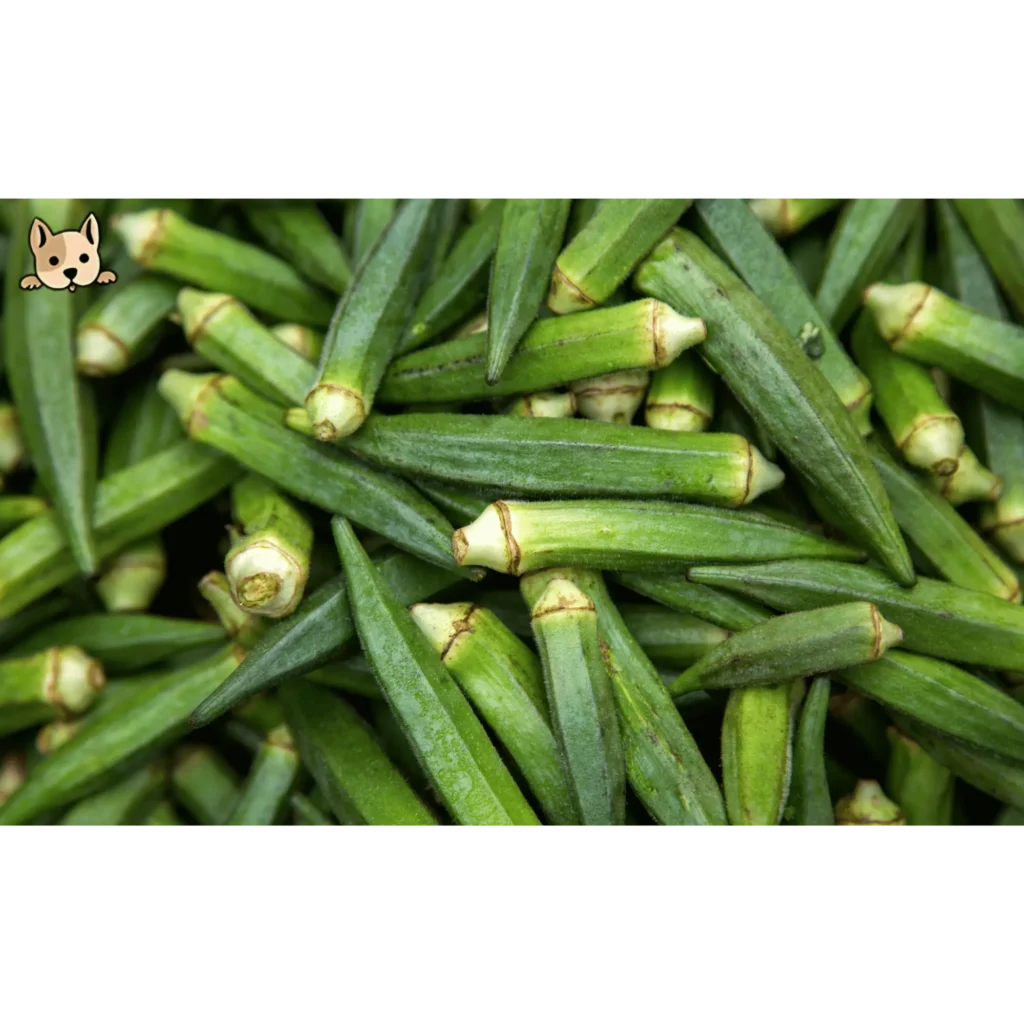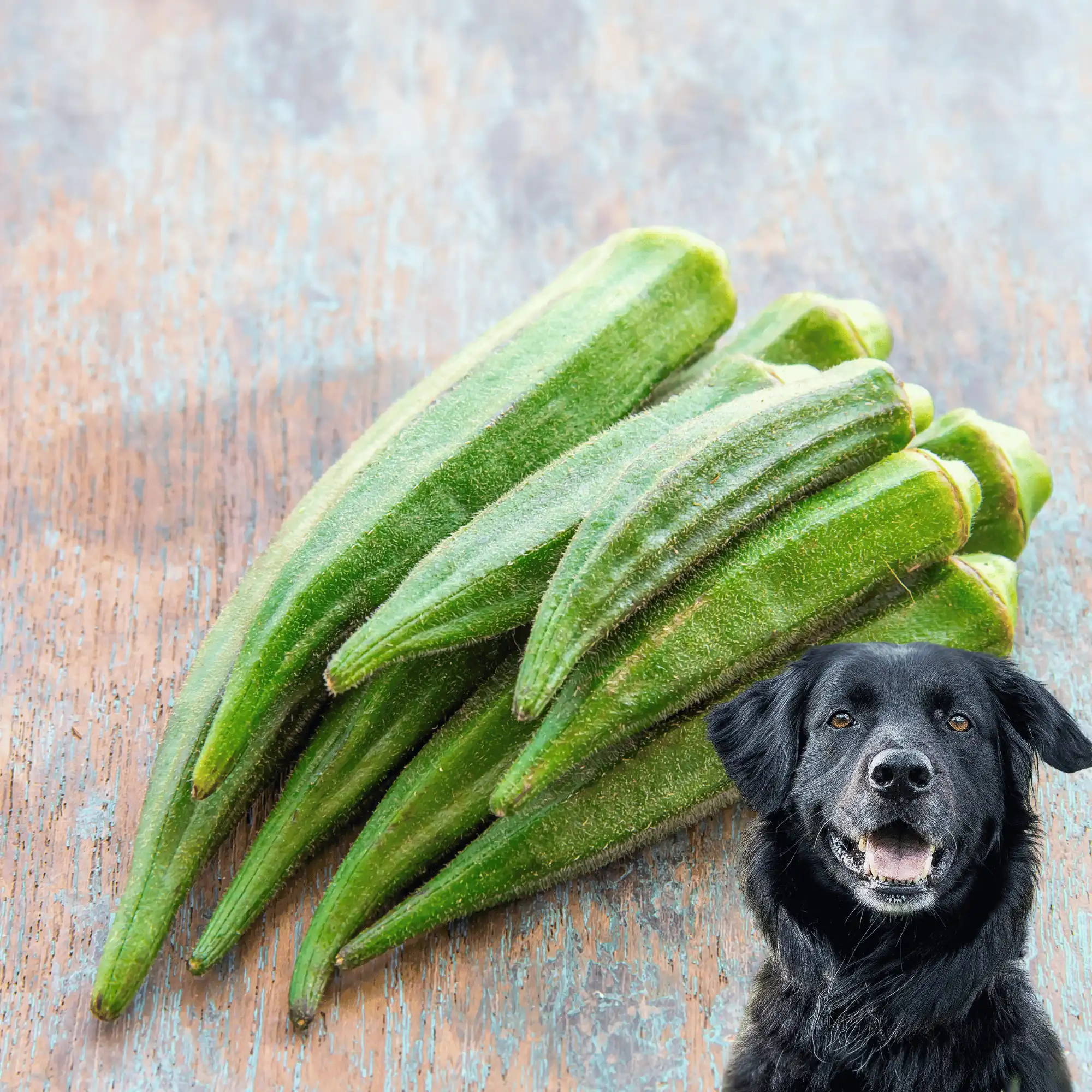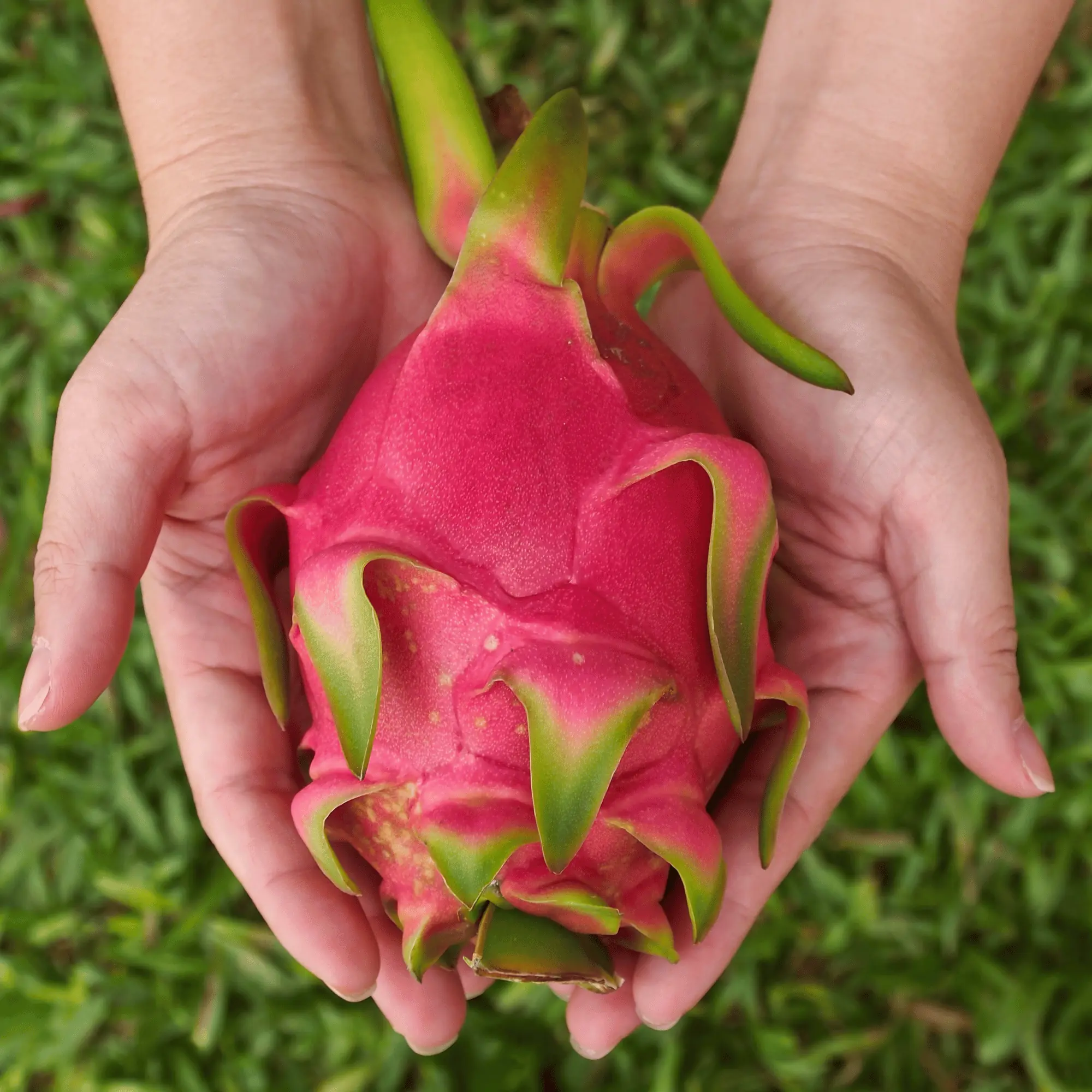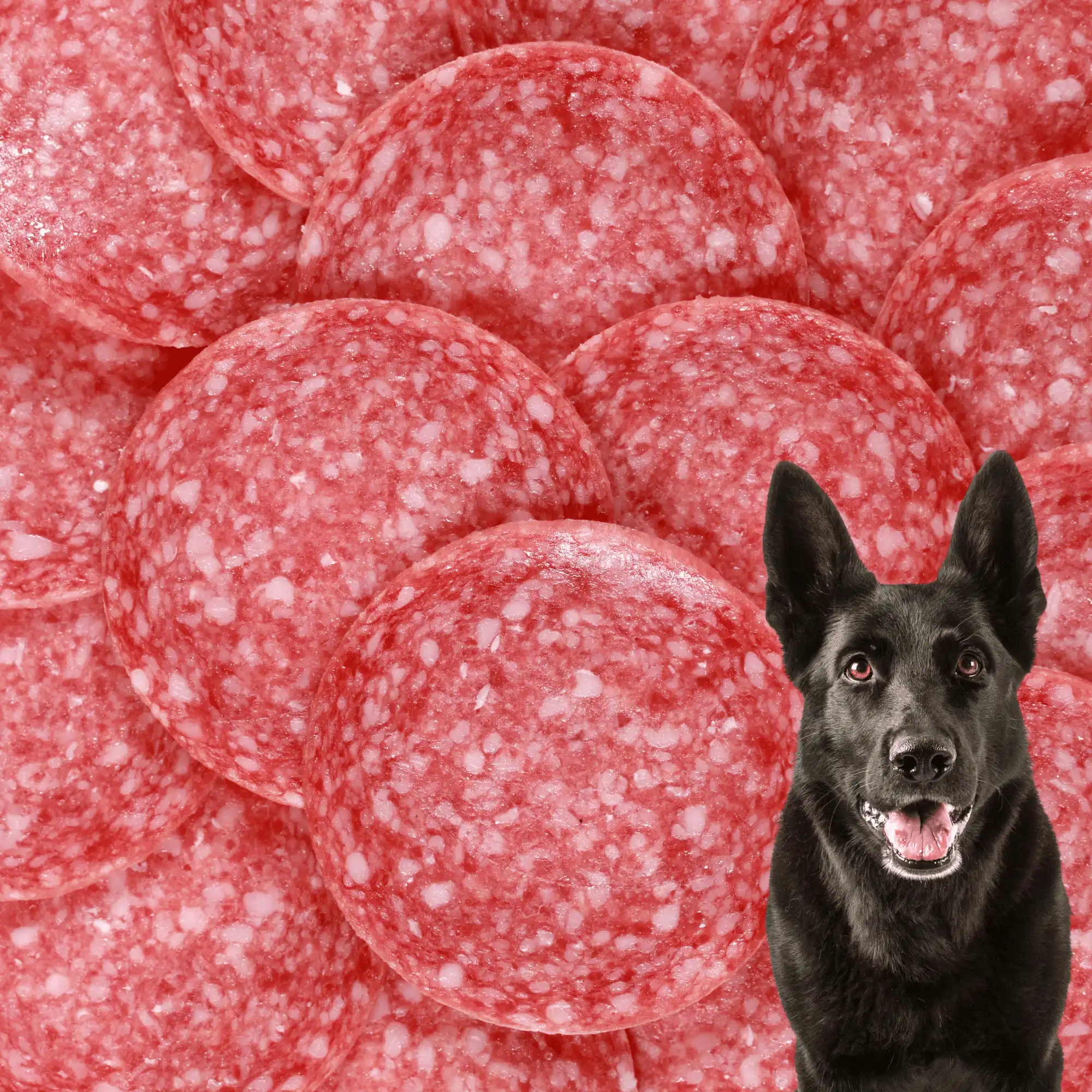Okra, with its unique texture and impressive nutritional profile, has garnered popularity among humans for its health benefits. As pet owners, it’s only natural to consider whether this versatile vegetable can also serve as a safe and beneficial addition to our dogs’ diets.
This blog post will explain the potential advantages and drawbacks of incorporating okra into your dog’s meals. By understanding its nutritional profile, health benefits, and possible risks, you’ll be equipped to make informed choices about feeding okra to your furry companion.
Here are the topics we’re following in this article:
- What is Okra?
- Can Dogs Eat Okra?
- Health Benefits of Okra for Dogs
- Potential Risk of Okra for Dogs
- How can I Safely Feed Okra to My Dog?
- Alternative Vegetables Safe for Dogs Besides Okra
What is Okra?

Okra, scientifically known as Abelmoschus esculentus and also referred to as lady’s fingers or gumbo, is a tall, flowering plant belonging to the mallow family. Native to East Africa, it is cultivated extensively for its edible green seed pods. These pods are a staple ingredient in cuisines across tropical, subtropical, and warm temperate regions worldwide. Okra is renowned for its slightly slimy texture and mild, distinctive flavor.
Rich in vitamins, minerals, and dietary fiber, okra offers numerous health benefits. It is commonly used in cooking as a thickening agent in soups and stews, adding both nutritional value and texture to dishes. Okra’s versatility and nutritional profile have contributed to its popularity in culinary traditions spanning from the southern United States and the Caribbean to Africa, the Middle East, and India.
Can Dogs Eat Okra?
Yes, okra is generally safe for dogs to eat and offers several nutritional benefits. It contains vitamins such as vitamin C and B vitamins, along with minerals like potassium, magnesium, calcium, and folic acid. These nutrients support various aspects of your dog’s health, including their immune system, metabolism, nerves, muscles, and bones.
Gumbo is also believed to have properties that may help in cancer prevention and can be beneficial for dogs with diabetes because it may help regulate blood sugar levels.
As with any new food, it’s important to introduce okra to your dog’s diet gradually and observe how they respond. Monitoring for any signs of digestive upset or allergies is recommended. Overall, feeding okra to your dog in moderation can have positive effects on their health and well-being.
Health Benefits of Okra for Dogs:

Lady’s Fingers offers several notable health advantages for dogs due to its nutrient-rich composition:
1. Rich in Nutrients:
Okra is packed with essential vitamins and minerals that are beneficial for dogs. It contains vitamin A, which supports vision and immune function, and vitamin C, which is important for skin health and immune system support.
It also has vitamin K, which is essential for blood clotting and bone health; folate, which is necessary for cell division and DNA synthesis; and magnesium, which aids in nerve and muscle function.
2. Digestive Health:
Okra is rich in dietary fiber, which plays a crucial role in maintaining digestive health in dogs. Fiber in okra makes your dog’s poop bigger, which helps keep their bathroom trips regular and prevents constipation.
Regular consumption of okra can help dogs maintain consistent and healthy bowel movements. It aids in the smooth passage of food through the digestive tract, reducing the risk of gastrointestinal discomfort and issues.
3. Low-Calorie Option:
With its low-calorie content, okra can be a beneficial treat for dogs needing weight management. It allows them to enjoy a snack without significantly increasing their calorie intake.
Providing okra as a snack helps satisfy dogs’ cravings without contributing to excessive calorie consumption. This makes it suitable for dogs on restricted diets or those prone to weight gain.
4. Antioxidant Properties:
Antioxidants in okra, such as flavonoids and polyphenols, help neutralize harmful free radicals in the body. This process reduces oxidative stress and cellular damage, supporting overall health and longevity in dogs.
By reducing oxidative stress and inflammation, okra’s antioxidants support a stronger immune system in dogs. This helps them better fight off infections and maintain optimal health.
5. Anti-Inflammatory Benefits:
By reducing inflammation, okra’s potential anti-inflammatory effects may contribute to improved joint health and mobility in dogs. This can help alleviate the stiffness and discomfort associated with joint conditions.
A reduction in systemic inflammation can support overall health and well-being in dogs, enhancing their quality of life.
When feeding okra to your dog, it’s important to prepare it properly and offer it in moderation. Always serve okra plain, without any seasonings or additives that could be harmful to dogs.
Potential Risks of Okra for Dogs:

When considering whether a lady’s finger is suitable for dogs, it’s important to be aware of potential concerns:
1. Choking Hazard:
The fibrous texture and shape of okra can be a choking hazard, especially for dogs with dental problems or those who tend to swallow food without chewing it properly.
2. Allergic Reactions:
Some dogs may develop allergies to okra, presenting symptoms such as itching, skin irritation, digestive upset, or respiratory issues. It’s crucial to monitor your dog closely after introducing okra into their diet.
3. Digestive Issues:
Due to its high fiber content, okra can cause digestive problems such as bloating, gas, or diarrhea, especially if introduced abruptly or fed in large quantities. Gradual introduction and moderation are key to minimizing these risks.
4. Potential for Obesity and Heart Issues:
Okra prepared with added fats like butter, salt, or fried can contribute to weight gain and potentially lead to heart problems in dogs if consumed regularly or in excess.
5. Pesticide Residues:
Washing okra thoroughly before giving it to your dog helps remove pesticides, dirt, and bacteria from its surface, lowering the risk of your dog ingesting harmful substances.
Consulting with your veterinarian before adding okra or any new food to your dog’s diet is essential. They can provide personalized advice based on your dog’s health status, dietary needs, and potential sensitivities to ensure their safety and well-being. Regular monitoring and responsible feeding practices are crucial to maintaining your dog’s health when incorporating new foods into their diet.
How can I Safely Feed Okra to My Dog?
It’s always advisable to consult your veterinarian to determine the safest way to feed okra to your dog. Whether raw or cooked, okra is generally safe for most dogs as long as it’s not fried. Frying adds unnecessary fat and calories to your dog’s diet, which can lead to digestive upset in the short term and weight gain over time. Moreover, frying foods can create harmful compounds called carcinogens, although the specific risks for dogs aren’t well-documented.
The best ways to offer okra to your dog are either cooked plain or raw. Moderation is key to avoiding any potential digestive issues due to okra’s high fiber content.
While okra can be prepared in various ways, it’s crucial to avoid adding ingredients like garlic, onions, or other foods that are toxic to dogs. Opt for cooking methods that preserve okra’s nutrients, such as steaming or using low heat. Avoid pickled or canned okra, as these often contain high levels of sodium and preservatives that can be harmful to your dog’s health.
Preparing okra yourself ensures you know exactly what your dog is eating. Whether served raw or lightly cooked, okra can be a beneficial part of your dog’s balanced diet, providing fiber, vitamins, and minerals.
Alternative Vegetables Safe for Dogs Besides Okra:
When it comes to feeding vegetables to your dog, it’s important to choose those that are safe and beneficial for them. Here’s a quick list of dog-friendly veggies that could be better alternatives to gumbo:
- Carrots
- Cucumber
- Celery
- Green beans
- Beets
- Edamame
- Asparagus
- Beans
- Bell peppers
- Brussels sprouts
- Kale
- Peas
- Spinach
- Sweet potatoes
- Zucchini
These vegetables are generally well-tolerated by dogs and can provide valuable nutrients like vitamins, minerals, and fiber. Remember to introduce new vegetables gradually into your dog’s diet and monitor for any adverse reactions. As always, consult your veterinarian before making significant changes to your dog’s diet to ensure it meets their nutritional needs.
Conclusion:
In conclusion, okra can be a healthy addition to your dog’s diet when given in moderation. Rich in vitamins, minerals, and fiber, okra offers several health benefits, such as supporting digestion, providing antioxidants, and potentially aiding in diabetes management. However, it’s important to be mindful of potential risks, including choking hazards, digestive issues, and allergies, especially if your dog has not eaten okra before.
To safely incorporate gombo into your dog’s meals, opt for plain cooking methods like steaming or light cooking without added fats or seasonings. Avoid processed forms of okra, such as pickled or canned varieties, which can contain harmful additives. Always monitor your dog’s reaction when introducing new foods, and consult your veterinarian for personalized guidance based on your dog’s individual health needs.
While lady’s fingers are generally safe for dogs, exploring a variety of dog-friendly vegetables ensures your pet receives a balanced and nutritious diet. Consider alternatives like carrots, green beans, and sweet potatoes as additional options to enrich your dog’s culinary experience and overall well-being.
By understanding both the benefits and potential hazards of feeding okra to your dog, you can make informed decisions to support their health and happiness effectively.
FAQs:
Is okra safe for dogs to eat?
Yes! Okra can actually be a nutritious snack for your dog, even though it might not be something you often have on hand. It’s packed with vitamins B and C, calcium, folic acid, and potassium, all of which are good for your dog’s health.
What vegetables are not good for dogs?
These are foods that are toxic to dogs and should be avoided:
- Onions, leeks, chives, and garlic.
- Grapes and raisins.
- Tomato leaf stems, or unripe young tomatoes.
- Green potatoes and potato leaves/stems.
Who can not eat okra?
People on blood thinners should consult their doctor before eating okra due to its vitamin K content, which can affect clotting. Although rare, allergic reactions to okra may include itching, hives, tingling around the mouth, difficulty breathing, or nasal congestion. Prompt medical attention is advised if any of these symptoms occur.
Is okra hard to digest?
Like many high-fiber foods, okra contains oligosaccharides, a type of carbohydrate that can be challenging for some people to digest. If you struggle to digest oligosaccharides, eating okra might lead to gas and bloating.











